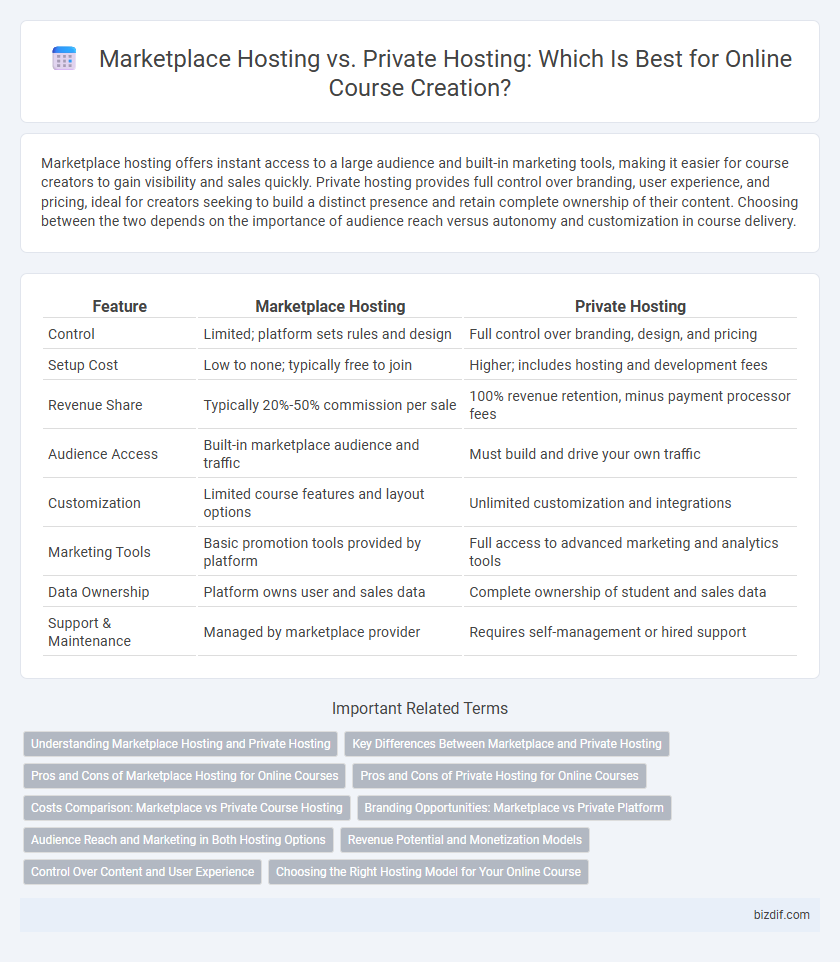Marketplace hosting offers instant access to a large audience and built-in marketing tools, making it easier for course creators to gain visibility and sales quickly. Private hosting provides full control over branding, user experience, and pricing, ideal for creators seeking to build a distinct presence and retain complete ownership of their content. Choosing between the two depends on the importance of audience reach versus autonomy and customization in course delivery.
Table of Comparison
| Feature | Marketplace Hosting | Private Hosting |
|---|---|---|
| Control | Limited; platform sets rules and design | Full control over branding, design, and pricing |
| Setup Cost | Low to none; typically free to join | Higher; includes hosting and development fees |
| Revenue Share | Typically 20%-50% commission per sale | 100% revenue retention, minus payment processor fees |
| Audience Access | Built-in marketplace audience and traffic | Must build and drive your own traffic |
| Customization | Limited course features and layout options | Unlimited customization and integrations |
| Marketing Tools | Basic promotion tools provided by platform | Full access to advanced marketing and analytics tools |
| Data Ownership | Platform owns user and sales data | Complete ownership of student and sales data |
| Support & Maintenance | Managed by marketplace provider | Requires self-management or hired support |
Understanding Marketplace Hosting and Private Hosting
Marketplace hosting offers online course creators instant access to a broad audience through platforms like Udemy or Skillshare, providing built-in marketing tools and simplified payment processing. Private hosting involves using dedicated Learning Management Systems (LMS) such as Teachable or Thinkific to maintain full control over branding, pricing, and user data while enabling customized course experiences. Choosing between marketplace and private hosting depends on the desired level of control, marketing reach, and revenue sharing preferences.
Key Differences Between Marketplace and Private Hosting
Marketplace hosting offers a ready-made platform with built-in audience access, streamlined payment processing, and marketing tools, ideal for creators seeking broad reach without technical setup. Private hosting provides full control over course branding, pricing, user data, and customization options, enabling tailored learner experiences but requiring more technical management and marketing efforts. The choice hinges on priorities between ease of use and autonomy in online course monetization.
Pros and Cons of Marketplace Hosting for Online Courses
Marketplace hosting for online courses offers extensive audience reach and integrated marketing tools, facilitating rapid student enrollment and brand exposure. However, it often involves high commission fees, limited control over pricing and branding, and potential competition with similar courses on the same platform. Instructors may face challenges in data ownership and customization, which can restrict long-term course growth strategies.
Pros and Cons of Private Hosting for Online Courses
Private hosting for online courses offers full control over branding, user experience, and content management, enabling creators to tailor their platform to specific audience needs. However, it requires significant investment in web development, security, and maintenance, potentially increasing costs and technical complexity. This hosting option also limits exposure compared to marketplaces, which can affect course discoverability and initial student acquisition.
Costs Comparison: Marketplace vs Private Course Hosting
Marketplace hosting for online courses typically involves lower upfront costs but includes ongoing transaction fees ranging from 10% to 30%, impacting overall profitability. Private course hosting requires higher initial investment in platforms like Teachable or Kajabi, often costing $29 to $299 per month, yet it offers complete control over pricing and branding without commission fees. Evaluating long-term expenses reveals private hosting can be more cost-effective for creators with high sales volume, while marketplaces suit those prioritizing minimal setup costs and built-in audience exposure.
Branding Opportunities: Marketplace vs Private Platform
Marketplace hosting offers limited branding opportunities as courses are presented alongside competitors under the marketplace's brand identity, restricting customization and visibility of the creator's unique brand. Private hosting platforms provide full control over design elements, allowing creators to customize their courses with logos, color schemes, and personalized domain names, enhancing brand recognition and customer loyalty. Leveraging private hosting ensures consistent brand messaging and a professional, cohesive learning environment that strengthens long-term audience engagement.
Audience Reach and Marketing in Both Hosting Options
Marketplace hosting offers access to a large, pre-existing audience, significantly enhancing course discoverability and organic traffic through established platforms like Udemy or Coursera. Private hosting allows full control over branding and customer data, enabling personalized marketing strategies such as targeted email campaigns and niche audience segmentation. Choosing between these options depends on prioritizing broad audience reach versus tailored marketing efforts and direct customer relationship management.
Revenue Potential and Monetization Models
Marketplace hosting offers greater exposure through established user bases, driving higher revenue potential via built-in sales channels and diverse monetization models like subscriptions, pay-per-course, and affiliate programs. Private hosting allows full control over pricing strategies, customer experience, and branding, enabling creators to maximize profit margins by eliminating platform fees and leveraging direct sales, memberships, and upselling techniques. Choosing between marketplace and private hosting depends on balancing audience reach with revenue optimization and the desired flexibility in monetization models.
Control Over Content and User Experience
Marketplace hosting offers limited control over content presentation and user experience, as courses are subject to platform guidelines and design constraints. Private hosting enables creators to fully customize course design, branding, and user interface, ensuring a tailored learning environment that aligns with their vision. Control over pricing, user data, and access settings is significantly enhanced in private hosting, facilitating personalized engagement and marketing strategies.
Choosing the Right Hosting Model for Your Online Course
Marketplace hosting offers built-in audience access, simplified payment processing, and increased visibility for online courses, but often comes with revenue sharing and limited customization options. Private hosting grants full control over branding, pricing, and learner experience, requiring investment in marketing and technical maintenance to drive traffic. Choosing the right hosting model depends on your goals for scalability, control, and resource availability.
Marketplace hosting vs Private hosting Infographic

 bizdif.com
bizdif.com